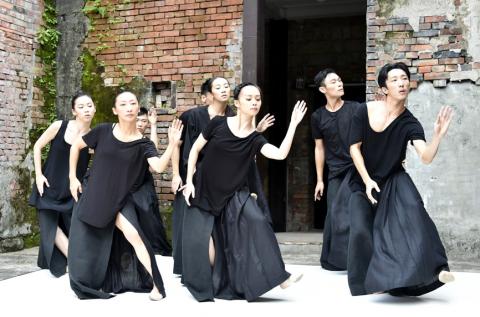Electronic music, shouts, stomps, incantations and dance movements mimicking religious rituals are all part of a production titled 13 Tongues (十三聲), which will be presented next year by Cloud Gate 2 to tell the story of Taipei’s earliest settlement.
The show was previewed on Wednesday on the historic Bopiliao block in the city’s Wanhua District (萬華) and is to premiere at the National Theater in March as part of the Taiwan International Festival of Arts.
Cheng Tsung-lung (鄭宗龍), a choreographer and artistic director of Cloud Gate 2, said that 13 Tongues was inspired by a tale he heard when he was a child.

Photo: Chen I-chuan, Taipei Times
“My mother once told me a story about a street artist called ‘13 Tongues,’ who performed in Wanhua District,” Cheng told reporters.
“He could play the role of a man, a woman, an elderly person or a child. He could also sing and peddle goods, and whenever he showed up, people would say: ‘Here comes 13 Tongues,’” he said.
For Cheng, the legendary street artist embodied Wanhua District during its peak period, with its bustling and colorful mix of street markets, temple culture, religious processions, traditional puppet theater shows and people from all walks of life.
Growing up in Wanhua selling slippers on the streets, Cheng said he was deeply influenced by the characters he encountered every day — vendors, homeless people, beggars and gangsters — and aimed to capture their expressions, body language and voices in his choreography.
“I hope to stir a feeling of familiarity in the audience and to move them a little,” Cheng said.
Cheng collaborated with award-winning Taiwanese composer Lim Giong (林強) on the music, which combines experimental and electronic music with incantations and ancient melodies from Hengchun in southern Taiwan.
The production is to be staged at the National Theater in Taipei from March 11 to 13, at the Chung Shan Hall in Taichung from March 18 to 19, at the Chiayi Performing Arts Center in Chiayi County on March 25 and 26, and at the Kaohsiung City Dadong Arts Center from April to 3.
Cloud Gate 2, a spinoff of the internationally renowned Cloud Gate Dance Theatre, was established in 1999 by Cloud Gate founder and artistic director Lin Hwai-min (林懷民) to give young choreographers and dancers an opportunity to showcase their original work.

A preclearance service to facilitate entry for people traveling to select airports in Japan would be available from Thursday next week to Feb. 25 at Taiwan Taoyuan International Airport, Taoyuan International Airport Corp (TIAC) said on Tuesday. The service was first made available to Taiwanese travelers throughout the winter vacation of 2024 and during the Lunar New Year holiday. In addition to flights to the Japanese cities of Hakodate, Asahikawa, Akita, Sendai, Niigata, Okayama, Takamatsu, Kumamoto and Kagoshima, the service would be available to travelers to Kobe and Oita. The service can be accessed by passengers of 15 flight routes operated by

Chinese spouse and influencer Guan Guan’s (關關) residency permit has been revoked for repeatedly posting pro-China videos that threaten national security, the National Immigration Agency confirmed today. Guan Guan has said many controversial statements in her videos posted to Douyin (抖音), including “the red flag will soon be painted all over Taiwan” and “Taiwan is an inseparable part of China,” and expressing hope for expedited reunification. The agency last year received multiple reports alleging that Guan Guan had advocated for armed reunification. After verifying the reports, the agency last month issued a notice requiring her to appear and explain her actions. Guan

GIVE AND TAKE: Blood demand continues to rise each year, while fewer young donors are available due to the nation’s falling birthrate, a doctor said Blood donors can redeem points earned from donations to obtain limited edition Formosan black bear travel mugs, the Kaohsiung Blood Center said yesterday, as it announced a goal of stocking 20,000 units of blood prior to the Lunar New Year. The last month of the lunar year is National Blood Donation Month, when local centers seek to stockpile blood for use during the Lunar New Year holiday. The blood demand in southern Taiwan — including Tainan and Kaohsiung, as well as Chiayi, Pingtung, Penghu and Taitung counties — is about 2,000 units per day, the center said. The donation campaign aims to boost

The Central Weather Administration (CWA) said a magnitude 4.9 earthquake that struck off the coast of eastern Taiwan yesterday was an independent event and part of a stress-adjustment process. The earthquake occurred at 4:47pm, with its epicenter at sea about 45.4km south of Yilan County Hall at a depth of 5.9km, the CWA said. The quake's intensity, which gauges the actual effects of a temblor, was highest in several townships in Yilan and neighboring Hualien County, where it measured 4 on Taiwan's seven-tier intensity scale, the CWA said. Lin Po-yu (林柏佑), a division chief at the CWA's Seismological Center, told a news conference